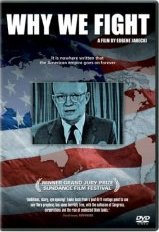
I've just seen the 2005 documentary Why We Fight and am deeply saddened. It very clearly and deliberately looks at the road from WWII to the present day occupation of Iraq, highlighting how we've arrived at these times of extreme corruption. The documentary uses the words of warning from President Eisenhower, in his farewell address, when he said:
"This conjunction of an immense military establishment and a large arms industry is new in the American experience. The total influence – economic, political, even spiritual – is felt in every city, every Statehouse, every office of the Federal government. We recognize the imperative need for this development. Yet we must not fail to comprehend its grave implications. Our toil, resources and livelihood are all involved; so is the very structure of our society."In the councils of government, we must guard against the acquisition of unwarranted influence, whether sought or unsought, by the military-industrial complex. The potential for the disastrous rise of misplaced power exists and will persist."
After watching this documentary in its entirety, I find myself greatly distressed. If we, the United States of America, are the liberators, then who will liberate us from the oppression and corruption of our government? Who will liberate us from the liberators? I have to wonder if many Iraqis are asking the same question today.
"The spirit of 1776 is not dead. It has only been slumbering. The body of the American people is substantially republican. But their virtuous feelings have been played on by some fact with more fiction; they have been the dupes of artful maneuvers, and made for a moment to be willing instruments in forging chains for themselves. But times and truth dissipated the delusion, and opened their eyes." --Thomas Jefferson to Thomas Lomax, 1799. ME 10:123
and
"The unquestionable republicanism of the American mind will break through the mist under which it has been clouded, and will oblige its agents to reform the principles and practices of their administration." --Thomas Jefferson to Elbridge Gerry, 1799. ME 10:83
The American people have been lulled to sleep by the war machine that has taken over this once great country. If we do not tread carefully, and yet take vital and radical steps to stem this corruption, we will see our country go the way of the Roman Empire. Capitalism and democracy have been in conflict since the inception of this country. Today democracy loses that struggle as corporations clearly hold sway over our elected officials. How do We the People restore balance to the system?

I leave you with these additional quotes from Thomas Jefferson:
"The government of a nation may be usurped by the forcible intrusion of an individual into the throne. But to conquer its will so as to rest the right on that, the only legitimate basis, requires long acquiescence and cessation of all opposition." --Thomas Jefferson to ----, 1825. ME 16:127
"Our fellow citizens have been led hoodwinked from their principles by a most extraordinary combination of circumstances. But the band is removed, and they now see for themselves." --Thomas Jefferson to John Dickinson, 1801. ME 10:217
"My confidence is that there will for a long time be virtue and good sense enough in our countrymen to correct abuses." --Thomas Jefferson to Edward Rutledge, 1788. ME 7:81
"What country can preserve its liberties if its rulers are not warned from time to time that their people preserve the spirit of resistance? Let them take arms. The remedy is to set them right as to facts, pardon and pacify them." --Thomas Jefferson to William Stephens Smith, 1787. ME 6:373, Papers 12:356
"The spirit of resistance to government is so valuable on certain occasions, that I wish it to be always kept alive. It will often be exercised when wrong, but better so than not to be exercised at all. I like a little rebellion now and then. It is like a storm in the atmosphere." --Thomas Jefferson to Abigail Adams, 1787.
"Most codes extend their definitions of treason to acts not really against one's country. They do not distinguish between acts against the government, and acts against the oppressions of the government. The latter are virtues, yet have furnished more victims to the executioner than the former, because real treasons are rare; oppressions frequent. The unsuccessful strugglers against tyranny have been the chief martyrs of treason laws in all countries." --Thomas Jefferson: Report on Spanish Convention, 1792

There is also the concept of 'The Permaanent War Economy' that was first originated in 1944 with an article by Walter J. Oakes, and later in Seymour Melman's book - ISBN 0-671-22261-9.
Ironically, Charles Wilson, the Secretary of Defense under Eisenhower was the one that suggested at the close of the war that the U.S. must not return to a civilian economy, but must keep to a "permanent war economy." As Eisenhower's
Secretary of Defense Wilson brought about the changes to the
Pentagon that resulted in the closer relationship between the military and industry.
One can speculate that the Marshall Plan was instrumental in the lack of the industrial downturn after WWII without the Marxist conjectures that compared it to the actual downturn that followed WW1.
Philip K Dick wrote a SF novel that sort-of parodied the idea of the permanent war economy - 'The Zap Gun". The idea was that weapons would be re-cycled as household goods and toys. It is questionable whether the revolution in consumer electronics and other goods is a spin-of from the "arms race" or if it was a symbiotic relationship.